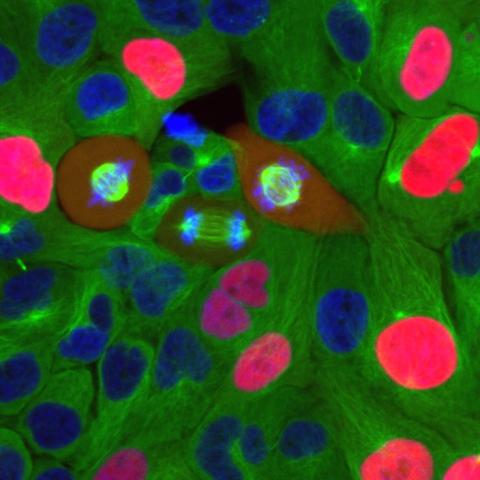
Breast cancer cells going through the cell cycle. Image credit: Cappell Lab.
Cells that are preparing to divide are not as committed to completing the process as scientists have long thought, according to research from Steven D. Cappell, Ph.D., Stadtman Investigator in the Laboratory of Cancer Biology and Genetics, and colleagues. Instead, the decision to divide is reversible. The finding, reported July 5, 2023, in Nature, could point researchers toward more effective drug combinations for cancer treatment.
When cells receive growth-promoting signals called mitogens, they enter the cell cycle — a series of steps that culminate in mitosis, which splits a cell in two. Scientists have long thought that the preparatory stage of this cycle includes a point after which cells cannot halt the process. After this “point of no return,” they thought, growth signals are no longer needed to drive cells to divide.
Postdoctoral researcher James Cornwell, Ph.D., noticed that not all cells behave this way. When he took growth signals away from growing cells, some managed to exit the cell cycle and return to a resting state, even when they had progressed beyond the supposed point of no return. Other scientists had reported similar observations, but none had offered an explanation for why cells sometimes break the long-established rule of cell cycle commitment.
To investigate, Cornwell captured videos of thousands of cells. He watched them go through the steps of the cell cycle, and he watched what happened to those cells when the mitogens were prevented from reaching them.
About 15 percent of cells responded to the withdrawal of mitogens by exiting the cell cycle. Those cells had something in common: they hadn’t been as far along in the cycle when they stopped receiving growth-promoting signals. “It takes them some time to exit the cell cycle. So if a cell is already close to mitosis, it doesn't have enough time to exit and it will go into mitosis,” Cornwell explains. In contrast, cells that had just started to prepare for division usually managed to exit the cell cycle when growth signals stopped.
Cappell says it’s essentially a race between two fates, with separate clocks counting down to mitosis and to a cell cycle exit. Usually mitosis wins, but the researchers found they could change the odds by stopping one of the clocks. When they blocked mitogen signaling and prevented cells from reaching mitosis, all cells exited the cell cycle — a process that took about 15 hours.
Cornwell repeated the experiments with many different kinds of cells, and the results were the same. All cells he tested were capable of exiting the cell cycle if they had enough time.
The researchers identified specific molecules that control the competing cell cycle clocks, and they say their findings have implications for cancer treatment. Drugs that inhibit the cell cycle regulators CDK4 and CDK6, such as the breast cancer drug palbociclib, likely interrupt cells’ progression through the cell cycle differently than previously thought. “It's going to be important to understand very accurately how every cell responds to these drugs in order to prevent relapse,” Cappell says. “We're now looking at whether we can take advantage of this new molecular mechanism to design a more durable therapy by combining CDK4/6 inhibitors with additional drugs.”